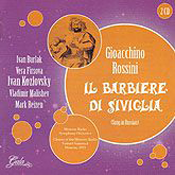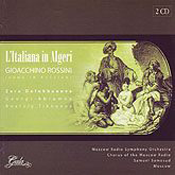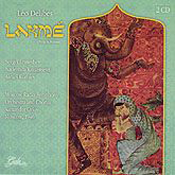
20 Jan 2008
Historic opera performances in Russian on Gala
Once the custom of the world's opera houses was to translate great operas into the language of each respective country.
The Sixteen continues its exploration of Henry Purcell’s Welcome Songs for Charles II. As with Robert King’s pioneering Purcell series begun over thirty years ago for Hyperion, Harry Christophers is recording two Welcome Songs per disc.
In February this year, Albanian soprano Ermonela Jaho made a highly lauded debut recital at Wigmore Hall - a concert which both celebrated Opera Rara’s 50th anniversary and honoured the career of the Italian soprano Rosina Storchio (1872-1945), the star of verismo who created the title roles in Leoncavallo’s La bohème and Zazà, Mascagni’s Lodoletta and Puccini’s Madama Butterfly.
Collapsology. Or, perhaps we should use the French word ‘Collapsologie’ because this is a transdisciplinary idea pretty much advocated by a series of French theorists - and apparently, mostly French theorists. It in essence focuses on the imminent collapse of modern society and all its layers - a series of escalating crises on a global scale: environmental, economic, geopolitical, governmental; the list is extensive.
Amongst an avalanche of new Mahler recordings appearing at the moment (Das Lied von der Erde seems to be the most favoured, with three) this 1991 Mahler Second from the 2nd Kassel MahlerFest is one of the more interesting releases.
If there is one myth, it seems believed by some people today, that probably needs shattering it is that post-war recordings or performances of Wagner operas were always of exceptional quality. This 1949 Hamburg Tristan und Isolde is one of those recordings - though quite who is to blame for its many problems takes quite some unearthing.
The voices of six women composers are celebrated by baritone Jeremy Huw Williams and soprano Yunah Lee on this characteristically ambitious and valuable release by Lontano Records Ltd (Lorelt).
As Paul Spicer, conductor of the Royal Birmingham Conservatoire Chamber Choir, observes, the worship of the Blessed Virgin Mary is as ‘old as Christianity itself’, and programmes devoted to settings of texts which venerate the Virgin Mary are commonplace.
Ethel Smyth’s last large-scale work, written in 1930 by the then 72-year-old composer who was increasingly afflicted and depressed by her worsening deafness, was The Prison – a ‘symphony’ for soprano and bass-baritone soloists, chorus and orchestra.
‘Hamilton Harty is Irish to the core, but he is not a musical nationalist.’
‘After silence, that which comes closest to expressing the inexpressible is music.’ Aldous Huxley’s words have inspired VOCES8’s new disc, After Silence, a ‘double album in four chapters’ which marks the ensemble’s 15th anniversary.
A song-cycle is a narrative, a journey, not necessarily literal or linear, but one which carries performer and listener through time and across an emotional terrain. Through complement and contrast, poetry and music crystallise diverse sentiments and somehow cohere variability into an aesthetic unity.
One of the nicest things about being lucky enough to enjoy opera, music and theatre, week in week out, in London’s fringe theatres, music conservatoires, and international concert halls and opera houses, is the opportunity to encounter striking performances by young talented musicians and then watch with pleasure as they fulfil those sparks of promise.
“It’s forbidden, and where’s the art in that?”
Dublin-born John F. Larchet (1884-1967) might well be described as the father of post-Independence Irish music, given the immense influenced that he had upon Irish musical life during the first half of the 20th century - as a composer, musician, administrator and teacher.
The English Civil War is raging. The daughter of a Puritan aristocrat has fallen in love with the son of a Royalist supporter of the House of Stuart. Will love triumph over political expediency and religious dogma?
Beethoven Symphony no 9 (the Choral Symphony) in D minor, Op. 125, and the Choral Fantasy in C minor, Op. 80 with soloist Kristian Bezuidenhout, Pablo Heras-Casado conducting the Freiburger Barockorchester, new from Harmonia Mundi.
A Louise Brooks look-a-like, in bobbed black wig and floor-sweeping leather trench-coat, cheeks purple-rouged and eyes shadowed in black, Barbara Hannigan issues taut gestures which elicit fire-cracker punch from the Mahler Chamber Orchestra.
‘Signor Piatti in a fantasia on themes from Beatrice di Tenda had also his triumph. Difficulties, declared to be insuperable, were vanquished by him with consummate skill and precision. He certainly is amazing, his tone magnificent, and his style excellent. His resources appear to be inexhaustible; and altogether for variety, it is the greatest specimen of violoncello playing that has been heard in this country.’
Baritone Roderick Williams seems to have been a pretty constant ‘companion’, on my laptop screen and through my stereo speakers, during the past few ‘lock-down’ months.
Melodramas can be a difficult genre for composers. Before Richard Strauss’s Enoch Arden the concept of the melodrama was its compact size – Weber’s Wolf’s Glen scene in Der Freischütz, Georg Benda’s Ariadne auf Naxos and Medea or even Leonore’s grave scene in Beethoven’s Fidelio.

Once the custom of the world's opera houses was to translate great operas into the language of each respective country.
Perhaps this trend died away with the greater ease of jet travel, or in a recoil from the ultra-nationalism which produced devastating wars. It certainly took a long time for Germany to begin offering, say, Verdi in Italian.
The trade-off is imperfect, however, as most singers sound their best singing in languages they are truly comfortable with. And what greater comfort than one's mother tongue? So three recent Gala releases of mid-twentieth century radio performances from Moscow of Italian and French repertory sung in Russian may at first seem like mere curiosities. Actually listening, however, may develop converts to the older style. Though initially the sharp, brusque sound of Russian may seem all wrong for Rossini or Delibes, the great singers captured here know their roles, and though these are not live performances, the sense of immediacy is palpable.
All the sets find room for extra tracks dedicated to one significant performer in each opera. Unsurprisingly, the Il Barbiere di Siviglia, recorded in 1953, focuses on the estimable tenor Ivan Kozlovsky. Besides his Almaviva in the opera, we also get on disc two his Gounod Romeo and in a particularly rare treat, a vocal version of Tchaikovsky dramatic overture to the Shakespeare tragedy, both sung with Yelisaveta Shumskaya's Juliet. Kozlovsky, in his early 50s at the time of the recording, retains his amazing upward extension, and ample evidence of that comes early in "Ecco ridente." Although all the recordings have decent sound, the hollow acoustic of the radio studio doesn't allow the tenor's tone to bloom, and it isn't always pleasing. But his technique still prompts respect.
The Figaro, Ivan Burlak, sings a rough but enjoyable "Largo al factotum." Vera Firsova's Rosina won't develop easily into the mopey countess of Mozart's Nozze. Her feisty, yet sweet, voice made your reviewer think of a Russian Victoria de los Angeles. In the singing lesson she performs a strong "Bel raggio lusinghier" from Semiramide. The great bass Mark Reizen growls humorously in a delightful "La Calumnia." The booklet essay, by the way, only provides biographies of Kozlovsky and Reizen, along with a brief synopsis of the plot and a few lines on the opera's premiere. Track listings for all three sets discussed in this review appear in the libretto's original language.
 Both the Barbiere and the L'Italiana in Algeri feature a clunky piano to accompany the recitatives. Although the cast is less familiar, the L'Italiana comes across as just as fun. Gala's chosen focus here is Zara Dolukhanova, with the entire booklet essay providing information on her career. In the bonus tracks, she offers a darker but still passionate Rosina for "Una voce poco fa." Two strong excerpts from Semiramide suggest that if the complete performance exists, it should be released. Her Russian version of Meyerbeer's "Nobles seigneurs salut!" from Les Huguenots confirms what her Isabella in the main performance demonstrated: she could move that creamy voice as smoothly and quickly as required. Her supporting cast delivers solid performances, with the tenor, identified as "A. Nikitin," being overshadowed by his counterparts on the other sets.
Both the Barbiere and the L'Italiana in Algeri feature a clunky piano to accompany the recitatives. Although the cast is less familiar, the L'Italiana comes across as just as fun. Gala's chosen focus here is Zara Dolukhanova, with the entire booklet essay providing information on her career. In the bonus tracks, she offers a darker but still passionate Rosina for "Una voce poco fa." Two strong excerpts from Semiramide suggest that if the complete performance exists, it should be released. Her Russian version of Meyerbeer's "Nobles seigneurs salut!" from Les Huguenots confirms what her Isabella in the main performance demonstrated: she could move that creamy voice as smoothly and quickly as required. Her supporting cast delivers solid performances, with the tenor, identified as "A. Nikitin," being overshadowed by his counterparts on the other sets.
 The third set leaves Rossini for Delibes's Lakme. The famous duet, "Viens, Malika," goes at a surprisingly snappy pace for Nadezhda Kazantseva, singing the title role, and Anna Maliuta. Kazantseva doesn't sparkle as some sopranos have done in the "Air des clochettes," though she has the notes. By the end of the set, a lack of variety in her tone has taken some of the exotic charm from her Lakme. Gala's choice for the spotlight here is the Gerard, tenor Sergei Lemeshev. He has more honey in his voice than Kozlovsky, but less individuality. The bonus tracks have sharper sound than the just adequate 1946 recording of the Delibes opera. Lemeshev's slight vibrato is loosening a bit in these tracks, though he sings a touching "Elle ne croyait pas" from Thomas's Mignon.
The third set leaves Rossini for Delibes's Lakme. The famous duet, "Viens, Malika," goes at a surprisingly snappy pace for Nadezhda Kazantseva, singing the title role, and Anna Maliuta. Kazantseva doesn't sparkle as some sopranos have done in the "Air des clochettes," though she has the notes. By the end of the set, a lack of variety in her tone has taken some of the exotic charm from her Lakme. Gala's choice for the spotlight here is the Gerard, tenor Sergei Lemeshev. He has more honey in his voice than Kozlovsky, but less individuality. The bonus tracks have sharper sound than the just adequate 1946 recording of the Delibes opera. Lemeshev's slight vibrato is loosening a bit in these tracks, though he sings a touching "Elle ne croyait pas" from Thomas's Mignon.
Considering the modest price Gala charges for its amply-filled sets, lovers of opera who want to explore the riches of a lost world of traditional opera performance should look for these sets. And Gala would do well to issue more, if more are to be found.
Chris Mullins